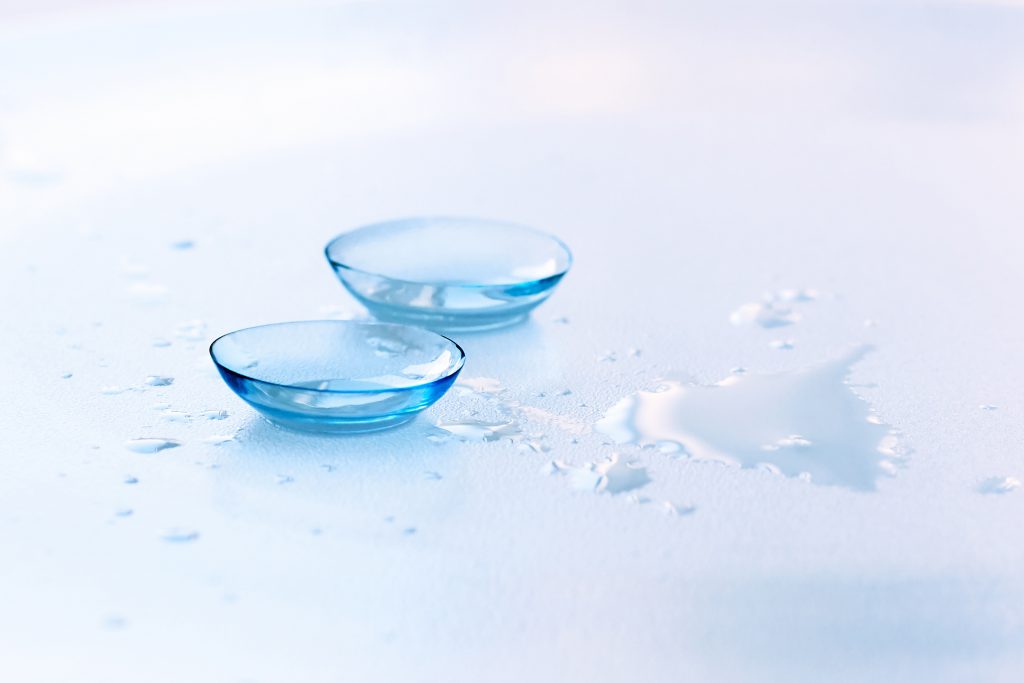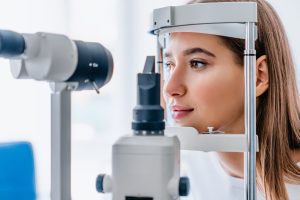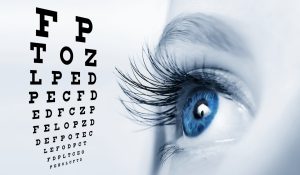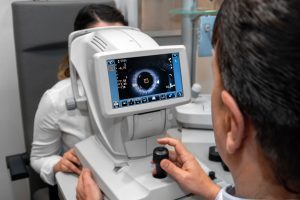Can I wear contact lenses if I have allergies?
Allergies can cause eye irritation and discomfort, making wearing contact lenses challenging for some individuals. However, certain types of contact lenses, such as daily disposables or lenses made from specific materials, might be more suitable for allergy sufferers. Consult your optometrist to discuss your allergy symptoms and determine the most appropriate contact lens options or if prescription allergy eye drops are recommended. Proper lens care, including regular cleaning and avoiding allergens that exacerbate symptoms, is essential to manage allergies while wearing contact lenses.
Symptoms of allergic reactions related to contact lenses
Common symptoms that may indicate an allergy or sensitivity to contact lenses or the solutions used with them:
- Itchy Eyes: This is often the most noticeable symptom. The eyes may feel incredibly itchy, especially when the lenses are in.
- Redness: The eyes may appear redder than usual, which can be a sign of irritation or allergic reaction.
- Tearing or Watery Eyes: Excessive tearing or watery eyes can occur as the eyes try to flush out the irritant.
- Swelling: The eyelids or the area around the eyes might swell due to an allergic reaction.
- Burning Sensation: A burning feeling in the eyes when contacts are in can be another symptom of an allergy.
- Discharge: You might notice unusual discharge from the eyes, which can be a reaction to the lenses or the solution.
- Blurred Vision: Allergies can sometimes cause blurred vision or make it seem like there is a film over the contact lenses.
- Increased Sensitivity to Light: You might become more sensitive to light, known as photophobia.
- Discomfort or Pain: General discomfort or eye pain when wearing contacts can indicate an allergic reaction.
- Dry Eyes: Feeling of dryness in the eyes, often accompanied by a gritty sensation.

Related FAQs
Wearing glasses or contacts can indeed affect dry eye symptoms, but the impact varies. Glasses can help shield the eyes from environmental factors that exacerbate dry eye, such as wind or air conditioning. On the other hand, contact lenses can sometimes worsen dry eye symptoms by absorbing tear moisture or by causing irritation. Certain types of contact lenses are designed to be more breathable and retain moisture better, which may be suitable for people with dry eyes. It’s crucial to discuss with an eye care professional to find the most appropriate type of contact lens or glasses. Proper care and hygiene when using contacts, along with regular breaks from screen use, can help minimize dry eye symptoms.
Dry eye syndrome can be both a temporary condition and a chronic disease, depending on its cause and severity. Environmental factors or certain life situations, such as screen use or air travel can cause temporary dry eye. Chronic dry eye, on the other hand, may result from systemic diseases, medication side effects, or age-related changes in tear production. Management and treatment can alleviate symptoms, but chronic dry eye often requires ongoing therapy. It’s important to consult with an eye care professional for an accurate diagnosis and treatment plan. Understanding the underlying cause is key to determining whether dry eye syndrome will be a temporary issue or a chronic condition.
Yes, some specific exercises and therapies can help relieve dry eye symptoms. Blinking exercises, for example, can help improve meibomian gland function and tear film stability. Warm compresses applied to the eyes can also stimulate tear production and release oils from the glands in the eyelids. Gentle eyelid massages can help spread the oils evenly across the eye surface, reducing dryness. Using a humidifier to add moisture to the air and taking regular breaks to rest the eyes during screen time can also be beneficial. Newer technologies such as IPL (Intense Pulsed Light) and RF (Radio Frequency) are also becoming available. Consulting with an eye care professional for personalized advice on exercises and therapies is recommended.
Sleep plays a crucial role in managing dry eye syndrome. Poor sleep can lead to insufficient eye lubrication and worsening dry eye symptoms. During sleep, the eyes rejuvenate and produce the moisture needed for the next day. Good sleep hygiene practices can help ensure the eyes are well-rested and hydrated. It’s also important to avoid sleeping with any airflow directly hitting the face, as this can dry out the eyes. Establishing a regular, restful sleep schedule can significantly improve dry eye symptoms.
Indeed, some medications can exacerbate dry eye symptoms. Diuretics, antihistamines, antidepressants, and some blood pressure medications are known to reduce tear production or alter tear composition. It’s important to review any current medications with a healthcare provider to determine if they could be contributing to dry eye symptoms. Sometimes, alternative medications with fewer dry eye side effects can be prescribed. Always consult with a healthcare professional before making changes to medication regimens. Patients should also stay hydrated and consider using artificial tears if taking medications known to cause dryness.
Yes, it is quite common for dry eye symptoms to worsen in certain weather conditions. Dry, windy, or smoky environments can lead to increased tear evaporation, exacerbating symptoms. Conversely, high humidity can sometimes alleviate dry eye symptoms because the air is more saturated with moisture. Cold weather, especially during winter when indoor heaters are used, can also dry out the eyes. It’s advisable to use humidifiers in such conditions to maintain indoor humidity levels. Wearing wraparound glasses or protective eyewear outdoors can help shield eyes from harsh conditions.
West Edmonton Vision Clinic
Visit our vision clinic in central West Edmonton for comprehensive eye exams, contact lens fittings, glasses, and more. LL Eyecare Centre is dedicated to providing the highest quality optometric services and products to our patients. Our team of experienced optometrists is here to help you with all of your eye care needs. Schedule an appointment today!
Clinic Hours
Monday Closed
Tuesday 9:00-5:00
Wednesday 9:00-5:00
Thursday 9:00-5:00
Friday 9:00-5:00
Saturday 9:00-2:00
Closed Sunday / Holidays




